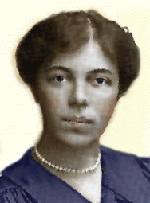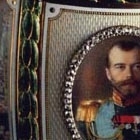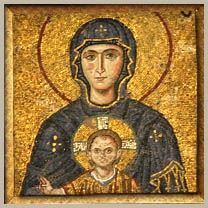Biographies - Grand Duchess Olga Alexandrovna
Grand Duchess Olga Alexandrovna
 As a child, Olga Alexandrovna was charming and adorable. She was particularly attached to her brother, Mikhail, nearest to her in age, and adored her father Alexander III. Olga had her father's broad features, but was elegant in her movements and feminine in a 19th century way. All her life she remained thin, and slight and a bit boney. She looked good in fine clothes, but was indifferent to them, preferring comfort over style. Over the years she collected a massive collection of beautiful and expensive jewelry, but gemstones didn't mean much to her. She preferred the simplest pieces. Had she not been a princess and taught that she was undressed without a string of pearls a ring or two and a bracelet, she might not have worn jewelry at all. Olga had a naturally warm and open personality, but she was trained to be reserved. She did not open up to others easily and felt uncomfortable discussing personal matters outside the family.
As a child, Olga Alexandrovna was charming and adorable. She was particularly attached to her brother, Mikhail, nearest to her in age, and adored her father Alexander III. Olga had her father's broad features, but was elegant in her movements and feminine in a 19th century way. All her life she remained thin, and slight and a bit boney. She looked good in fine clothes, but was indifferent to them, preferring comfort over style. Over the years she collected a massive collection of beautiful and expensive jewelry, but gemstones didn't mean much to her. She preferred the simplest pieces. Had she not been a princess and taught that she was undressed without a string of pearls a ring or two and a bracelet, she might not have worn jewelry at all. Olga had a naturally warm and open personality, but she was trained to be reserved. She did not open up to others easily and felt uncomfortable discussing personal matters outside the family. Her childhood was a happy one. Her father, Alexander III, doted on her and Mikhail, who were the youngest of his five children and the most often at home because of their age. They took long walks in the forests surrounding Gatchina Palace, which was among all the Imperial Palaces in the environs of St. Petersburg considered the family 'home'. During these long hikes, Alexander taught Mikhail and Olga how to built campfires and forage for mushrooms. These outings gave Alexander a welcome break from his responsibilities as Emperor and created a unique closeness between them. They remained fond memories for Olga and she remembered them often throughout her life as the happiest moments of her childhood.
Alexander III died when Olga was only 12. She was still a child and suffered greatly from the loss of her father. Once she had recovered form the premature death of her husband, Marie, was somewhat at a loss as to how she would make up for the loss of a father in Mikhail's and Olga's lives. Naturally, she turned to her son, the new Emperor, to assume this role. After all, he was now the official 'head' of the Romanov clan. Perhaps Nickolas did the best he could, however he was preoccupied by his new responsibilities and a new wife. Even had he found the time, there was no way Olga and Mikhail could think of their older brother as a substitute for their father. He and Nickolas were totally different in appearance, mood and personality.
Marie was, to a degree, a cold and distant parent. She knew it and it bothered her. Her lack of warmth didn't mean that she didn't love her children, quite the opposite. It was an issue of priorities. The center of her life was first her husband, followed by her role as Empress of Russia, with he rest of the family coming in third. One could suppose this was due to a certain awkwardness around children that Marie felt. She found them hard to talk to and kept them segregated in the segment of her life that she reserved for them. Marie saw her children everyday, but unlike her daughter-in-law, Aleksandra, she never had pillow fights with them. Dancing, entertaining, conversation - the world of St. Petersburg aristocracy - this was her natural abode. Marie glittered in society, moving regally with an unrivalled ease. Although she was short she carried herself in a way that no one ever doubted her strength and resolve. She was a tough woman and even rigid. Marie was used to having her own way. After her husband died this became even more pronounced, since there was now no one who could - or would - contradict her wishes. Attendants found her tough and demanding to serve. She appreciated having Olga around, treating her increasingly like a servant as she got older, all the time still expecting the love and devotion of a daughter. It was natural that Olga, a growing teenager, would resent being treated this way. It was obvious that she often preferred the company of her nanny, dog and teachers to being with her mother. This hurt Marie, but it fit in with her own inclination to relegate her daughter's raising to others.
For many years Olga had known the Oldenburgs, one of the rich aristocratic families of Russia. They had a son, Peter, a slight, thin, fair-haired man who was a professional officer. Peter was handsome, sophisticated - and homosexual. To many people's surprise, one day he asked Marie for Olga's hand in marriage. Why Marie said yes is hard to explain. Maybe she wanted to keep Olga nearby, a foreign marriage would have taken her daughter abroad . What ever the reason, Olga was completely naive about sexual matters and probably had no idea what a homosexual was. She had no reason to be hesitant about the proposal - after all it would mean she'd be moving out on her own. So, she married Prince Peter Oldenburg in a beautiful, bejewelled ceremony. The gifts she received were magnificent. Her husband showered her with gems and fine clothes. He was dutiful and attentive in public, reserved and distant in private. The marriage was never consummated. For several years Prince Peter was stationed at Tsarskoe Selo and he and Olga established a residence there. Being nearby and often ignored by her husband, who spent most of his time with fellow officers, Olga became a regular visitor to the Alexander Palace and developed a much closer relationship with her older brother Nickolas than she had with him as a child. She also became friends with his wife Aleksandra, whom she liked very much. Those feelings were returned.
She was also close to the Grand Duchesses, having watched them grow up from infants to young ladies. In watching their lives and the routine of the palace Olga thought she saw many of the same tenancies which made her ill-prepared for real life. She worried about the future of the princesses and the effect of the suffocating climate of the children's quarters in the Alexander Palace. They had no one to escort them about society, their mother had raised them virtually by herself. Since Aleksandra was withdrawn and repelled by parties and balls, Olga felt she was the only one who could take on the task. In order to expand the Grand Duchesses' circle of friends and introduce them gradually to the real world, Olga would take them on Saturdays by train from Tsarskoe Selo to St. Petersburg. There they would drive to their Grandmother's palace where there were special parties held for them, with dancing and other young people to mix with and meet. Olga did this very delicately, without alarming their overly protective parents; this no small feat and a tribute to the trust Nickolas and Aleksandra had for her.
With the advent of WWI the parties stopped. Olga became a nurse and worked long hard hours working with the wounded. She also fell in love. His name was Colonel Nickolai Koulikovsky. The time came to end the marriage with Prince Peter, which was annulled with the Tsar's permission. She married Koulikovsky and had two sons. After a harrowing time in Kiev and the Crimea during the Revolution, Olga and Nickolai escaped from Russia during the revolution and went to Denmark. Here she lived with her mother who accepted Koulikovsky, as her daughter's husband but always as an inferior. It was a difficult time for everyone. Finally, Olga and Nickolai moved to Canada, where Olga lived out her final years painting and raising her children. To the end she remained loyal to the memory of her brother and the rest of her family.
Please send your comments on this page and the Time Machine to boba@pallasweb.com
© 1995-2004 Bob Atchison | Website by Pallasart Web Design





 Imperial Bedroom
Imperial Bedroom Portrait Hall
Portrait Hall Mauve Room
Mauve Room Maple Room
Maple Room Aleksey's Bedroom
Aleksey's Bedroom Nicholas's Study
Nicholas's Study Aleksey's Playroom
Aleksey's Playroom Formal Reception
Formal Reception Balcony View
Balcony View Aleksey- Balcony
Aleksey- Balcony Children-Mauve
Children-Mauve Nicholas's Bathroom
Nicholas's Bathroom Alexandra- Mauve
Alexandra- Mauve Nicholas's Reception
Nicholas's Reception Tsarskoe Selo Map
Tsarskoe Selo Map